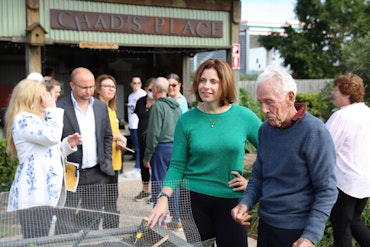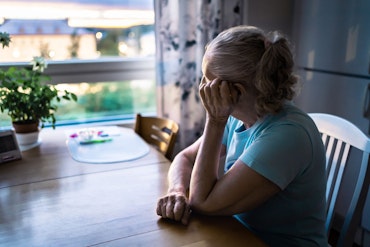One in three Aussies reported a fear of people with dementia
Approximately 400,000 Australians live with dementia and more than 1.5 million people are estimated to provide dementia care.
![<p>New data found that much like a fear of the dark — common misconceptions about dementia may influence a growing fear. [Source: Shutterstock]</p>](https://agedcareguide-assets.imgix.net/news/articles/wp/dementiaaustra__1809.jpg?fm=pjpg&format=auto&w=550&q=65)
New data found that much like a fear of the dark — common misconceptions about dementia may influence a growing fear. [Source: Shutterstock]
Key points:
- Dementia Action Week, from September 18 – 24, highlights the growing need for public understanding and awareness
- Almost a third of Australians reported a fear of people living with dementia
- The number of Australians who reported a fear of dementia grew by nine percent over the past decade
New research from Dementia Australia found Australians were more fearful of people living with dementia than they were a decade ago. Advocates from the peak body and charity have called on councils, businesses, community groups and leaders to address public perceptions surrounding the condition.
Approximately one in three Aussies reported that they were afraid of people with dementia, with representatives from Dementia Australia suggesting that the widespread misunderstanding may stem from depictions in popular culture.
Retired psychologist and Dementia Australia Advisory Committee Chair Bobby Redman, who lives with dementia, said stereotypes could be misleading the public.
“If you have this stereotype of what a person with dementia is and it’s somebody who is violent or aggressive — you’re seeing an extreme,” Ms Redman said.
“However, if you know someone with dementia, you’ll realise that we’re just regular people with an illness. It’s similar to any type of discrimination or stigma — once you know people from that community, they’re no longer scary.”
Ms Redman explained that there were avenues to enact change and help the public understand the condition, which is also the nation’s second leading cause of death.
“We have the resources and information freely available on our website for anyone to make a start,” she said.
“Inspiring our communities to become more dementia-friendly — where people living with dementia are supported to continue to live their lives in the communities they know and love; where they are supported to continue to contribute to those communities, they have been part of their entire lives — can be so simple and empowering for all involved.
“We must act now for a dementia-friendly future. After all, a dementia-friendly future is one that is better for everyone in the community.”
Maree McCabe AM, chief executive officer of Dementia Australia, explained that a lack of understanding about the condition leads to real-world impacts on people living with dementia.
“There is also research, commissioned by Dementia Australia, showing that 80 percent of those with a loved one living with dementia felt that people in shops, cafes and restaurants treated people with dementia differently,” Ms McCabe said.
“These are our parents, grandparents, friends and neighbours — now and in the future, it could be anyone reading this who might be diagnosed with dementia.
“These are devastating findings — this fear leads to stigma and discrimination which can have a real and distressing impact on people living with dementia, their families and carers. People may avoid seeking critical medical and social support and become increasingly socially isolated.
“Dementia is a largely invisible disease and what we can’t see, we don’t understand and what we don’t understand, we are often afraid of and then avoid.”
A report, published by the Association of British Dispensing Opticians in June, found depictions of people with dementia in popular culture fuelled a stigma of ‘horror,’ characterised by zombie-like behaviour.
“If they had personal connections to dementia, it should stimulate feelings of anger,” Elaine Grisdale wrote.
“Popular culture is guilty of encouraging stigma around dementia. Whether it be through literature, film or the news media, negative language and images are known to create social distance between [people with dementia] and those without the condition.
“Several stereotypes of dementia in the media use language and images that suggest [people with dementia] are inactive due to impairment or age, with no quality of life.”
As Dementia Action Week kicks off on September 18, Dementia Australia has encouraged members of the general public, along with carers and advocates, to stay informed about the condition. For more information, please review online materials published by the organisation and do your part to create a better and dementia-friendly future.
If this story has prompted any questions or concerns, please call the National Dementia Helpline 1800 100 500 — 24 hours, seven days a week — or visit dementia.org.au.
Take action this Dementia Action Week and sign up to the Talking Aged Care newsletter to learn more about a common condition in the aged care sector. Tell us your story if you or someone you know is living with dementia.























Comments